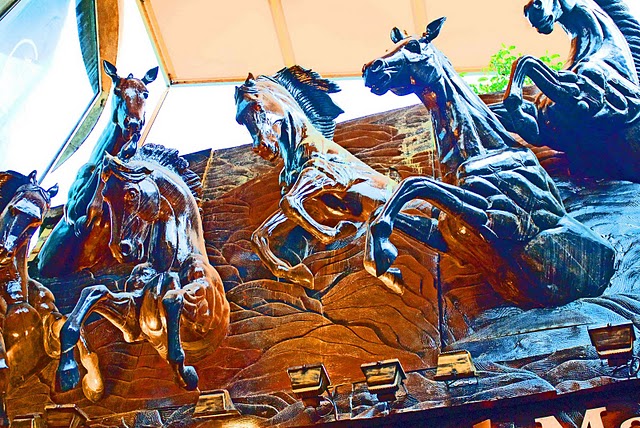California college students are letting everyone know that things are looking bad...
http://www.guardian.co.uk/world/2009/sep/24/california-university-berkeley-budget-protest
University of California campuses erupt into protest
Students and faculty members demonstrate against plans to
raise tuition fees and cut workers
By Mary O'Hara in California
In the sweltering California heat with their placards,
posters, red armbands and chants of "no cuts, no fees,
education should be free", the demonstrators packed in to
Sproul Plaza at the centre of University of California
Berkeley campus today meant business.
The crowd cheered and passing cars hooted as speakers implored
them to fight state authorities' plans to hike student fees
and lay off workers.
Daniella, a petite second-year Latina undergraduate sitting
quietly in the shade echoed what many making the rallying
calls were articulating. "My whole life I wanted to come here.
If they increase the fees I will have to drop out. We have to
fight this."
The Berkeley protest was one of many held across California in
an unprecedented day of action directed at university
authorities and state governor, Arnold Schwarzenegger as he
attempts to curb the state's multibillion-dollar budget
crisis. Faculty, students and unions from the University of
California's 10 campuses including its two most prestigious,
UCLA and Berkeley, joined forces in what was the biggest
student protest for more than a generation.
The scale of the protests has come as a shock to state
authorities. What began as a marginal dispute in the summer
between university faculty and their management over cuts in
salaries has in recent weeks escalated into a statewide
walkout by students and faculty as well as a day of strike
action by campus technical workers against layoffs and
diminished terms and conditions.
The turning point came two weeks ago when university
authorities warned of savage budget cuts to deal with a $750m
(£466m) shortfall and mooted huge increases in the cost of
tuition. "UC regents vote next week to raise student fees,
already up 250% over the last decade, by an additional 30%,"
was how one group of protesters summed up the situation today.
In a move that will reignite debates around racial inequities
in education one group demonstrating labelled the proposed
hike in fees as "twisted and racist", saying it would mean
more low-income and ethnic minority students would be unable
to afford a college education. They also criticised proposals
to increase the proportion of out-of-state students - who pay
markedly higher fees - to 26% alleging it would further reduce
the opportunities for young people from low-income groups or
ethnic minorities living in California to secure a university
place.
In a swipe clearly directed at the governor's office one
provocative leaflet read: "Annually the state pays $49,000 per
prison inmate and less than $14,000 per UC student. If the
state can lock us up, it can invest in our education for
one-third of the cost."
A spokesman for the group Graduate Students of Colour said:
"Students of colour are asking a crucial question: Why now,
and why us? California's population of college-age adults is
majority black and brown. Whatever other reasons are cited,
that underlying condition is left unspoken."
In recent years student demonstrations in California have been
small-scale and largely single issue-led such as those held
after Hurricane Katrina when students protested against the
Bush administration's response in the immediate aftermath.
Signs that the latest protests were different and that
feelings were running especially high were evident in the
run-up to the walkout with fringe meetings mushrooming across
campuses to galvanise support. At UC Berkeley activists could
be seen donning red armbands while at UC Davis one preliminary
protest yesterday included a "naked" demonstration by a small
group of students accusing authorities of "stripping" the
education system.
Facebook and Twitter campaigns were also launched while over a
thousand faculty members across all campuses signed an online
petition rejecting budget cuts and proposing alternative ways
to save money such as trimming the salaries of education
bosses and senior officials plus tapping into reserve funds.
For many this latest wave of protest in California is
reminiscent of the 1960s when UC Berkeley in particular earned
a reputation as the epicentre of student activism when it
spawned the Free Speech Movement. It was also the last time a
former Hollywood actor, Ronald Reagan, was governor. Author
and scholar at UC Berkeley's geography department Gray
Brechin, who was an undergraduate at Berkeley during the 60s
unrest said the current dispute had been "simmering" under the
surface for months.
He said many in the university are concerned that California's
budgetary problems are being used as "an excuse" to dismantle
the state's public university system and move it toward a
system reliant on private donors for funding. "California is
beyond broke. The wealthiest state in the nation is bankrupt.
These problems began a long time ago. What we need is a more
progressive tax system to fund the university, not to
dismantle it."
The UC system, the largest network of its kind in the US with
over 220,000 students and more than 170,000 faculty, is widely
regarded as a flagship public university often outperforming
privately-funded prestigious schools such as Stanford just a
few miles from Berkeley in the home of hi-tech, Silicon
Valley. University authorities have staunchly denied
suggestions of an attempt to undermine public education.
California's colossal budget crisis has become an
ever-increasing thorn in the side of the governor as more
people feel the pain of cuts in expenditure on schools and
other services on top of the fallout from recession. The state
is an estimated $15bn in debt with no way out in sight.
Today's protests come close on the heels of another
politically sensitive initiative. Just last week the governor
granted early release to thousands of prisoners in a
cash-saving exercise. But if the prisoner release controversy
was embarrassing, the dramatic public education furore looks
set not only to be a more enduring and contentious problem but
possibly one that attracts nationwide attention.


